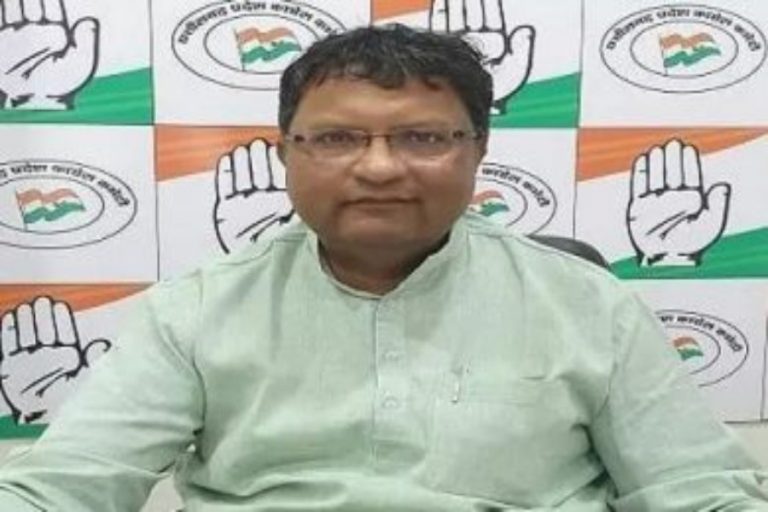Raipur: September 19, 2020. Three new agriculture related bills brought by the Modi government, Congress termed the plan to make the puppet in the hands of a few capitalists. With the new ordinance, the BJP government, which is conspiring to mortgage the farm-barn to the capitalists, swears by the farmers and plays friendship with a handful of capitalists. Today, Bahubali Modi government has launched a brutal ‘black’ Wrote the chapter ‘ Farmers – after traversing the bright future of the farm laborers, wrote a ruin and ruin in their fate.
Shailesh Nitin Trivedi said that the merciless BJP government wasted the fate of India’s destiny farmers and farmers and fulfilled the dream of a handful of bourgeois friends. 62 crore farmer-laborers and more than 250 farmer organizations across the country are raising their voice against these laws, but Prime Minister Modi is ignoring the objections and tricking the country. Far from listening to the Annadata farmer, the voice of his nominees is being suppressed in the Parliament and farmers and laborers are being beaten with sticks in the streets.
Recall that the Modi government had brought three ordinances against the ‘fair compensation law’ of land made by Mr. Rahul Gandhi and the Congress with similar arguments. Today again three black laws have been introduced to end the livelihood of the farmers.
Shailesh Nitin Trivedi, chairman of the Department of Communications, said that the Modi government is an attacker on Corona, China on the border and agriculture in the country. It is like an incurable corona epidemic, which is proving fatal to farming and farming. The workers-peasants and the Congress will fight a decisive struggle against these black laws ‘from Parliament to the road’.
Our loud voice cannot be suppressed by the felony of the majority. The vocal objections of the farmers and Congress against the black laws of Modi ji are as follows: –
First, the abolition of the grain market-vegetable market ie APMC will completely destroy the ‘agricultural produce purchase system’. In this case, the farmers will neither get the ‘minimum support price’ (MSP) nor the price of the crop according to the market price. A living example of this is BJP-ruled Bihar. In 2006, the APMC Act i.e. Grain Mandis were abolished. Today, the condition of the farmer of Bihar is worse than bad. Brokers buy the crop of the farmer at one and a quarter of the price and sell it on the MSP to make profits in the mandis of other provinces. If the entire agricultural produce market system is finished, then the biggest loss will be to the farmer-farm laborers and the biggest benefit to the handful of capitalists.
Secondly, the claim of the Modi government that now farmers can sell their crop anywhere in the country is completely white lies. Even today the farmer can take his crop to any province and sell it. But what is the real truth? According to the Agricultural Census 2015-16, 86 percent of the country’s farmers own less than 5 acres of land. The average value of land is 2 acres or less. In such a situation, 86 percent farmers cannot transport or sell their produce anywhere other than the grain market-vegetable market. As soon as the mandi system is destroyed, the direct attack will naturally be on the farmer.
Thirdly, once the mandis are over, the livelihood and livelihood of lakhs and crores of laborers, jobbers, accountants, hauldars, transporters, shellers etc. working in the grain-vegetable market will automatically end.
Fourth, the farmer gets a fair price in the grain market-vegetable market near the farm, based on the collective organization of the farmer and the competition between the buyers in the market. The predetermined ‘minimum support price’ (MSP) in the mandi is the benchmark for the pricing of the crop of the farmer. This is one of the measures, which allows a collective ‘price discovery’ of the farmers’ produce. The grain-vegetable market system is a guarantee of the right price, right weight and right sale of the crop of the farmer. If a handful of companies will buy a farmer’s crop from his farm instead of a collective purchase in the market, then the power of pricing, weight and collective bargaining of price will be lost. Naturally the farmer will suffer.
Fifth, with the end of the grain-vegetable market system, the income of the provinces will also end. The provinces through the ‘Market Fee’ and ‘Rural Development Fund’ undertake infrastructure development of rural areas and encourage cultivation. For example, Punjab procured 127.45 lakh tonnes of wheat in this wheat season. 736 crore to Punjab. The market fee and the same amount was received in the Rural Development Fund. 613 crores to the commissioners. Commission received. These were not paid by the farmer, but by the government agencies and private persons of FCI, Government of India, who procured wheat from the mandis. This source of income will end automatically after the mandi system ends.
Sixth, agricultural experts say that under the guise of the ordinance, the Modi government actually wants to implement the report of the ‘Shanta Kumar Committee’, so that it does not have to buy at the minimum support price through FCI and between 80,000 and 1 lakh crore annually Be saved Its direct adverse effect will be on the farm barn.
Seventh, through the ordinance, the farmer will be made a laborer in his own land by trapping him in the ‘contractual practice’. Is the poor farmer owning two to five acres of land capable of making, understanding and signing contracts with big companies for procurement of crops? The answer is clearly no.
The biggest drawback of the contract farming ordinance is that it is not compulsory to provide minimum support price ie MSP. When the mandi system ends, the farmer will only be dependent on contract farming and the big companies will set the price of his crop in the farmer’s will. What is this new zamindari system, if not? Not only this, through contract farming, the poor farmer has been left at the mercy of the court and bureaucracy with big companies. In such a situation, powerful big companies will naturally attack the farmer on his livelihood by making an impact on the bureaucracy and entangling him in the legal complexities and make a profit.
Eighth, by completely removing the stock limit of agricultural produce, food items and fruits and flowers, neither the farmer nor the consumer will ultimately benefit. Only a handful of people hoarding and black-marketing things will benefit. They will be able to buy things cheaply, hoard them by law and sell things at expensive prices. For example, in the Rabi 2020-21 report of the Commission for Agricultural Costs and Prices, it was alleged that the government buys and stocks pulses from farmers and sells them in the open market if the pulses crop is coming up. Due to this, farmers do not get the market price. The Rs 2.5 lakh crore dal scam in 2015 is a living proof of this, when Rs 45. Import of pulses in kg and Rs 200. Up to a kilo was sold.
When the stock limit is exhausted, hoarders and black marketers will have complete freedom to rob the consumer.
Ninth, there is neither a provision in the ordinances for the protection of the rights of farm laborers nor of the rights of share-croppers or mazars. He seems to have been completely dismantled and left.
Tenth, all three ordinances are a direct attack on the ‘federal structure’. ‘Farming’ and ‘mandis’ come under the jurisdiction of provincial rights in the seventh schedule of the Constitution. But even the Modi government did not think it appropriate to consult the provinces. Protection and promotion of agriculture is naturally a matter of provinces, but no opinion was taken from them. The market fees and rural development fund for the uplift of the farm barn and village were unilaterally abolished. This in itself is against the practice of the Constitution.
Shailesh Nitin Trivedi, chairman of the communications department, said that the Annadata farmers and laborers of the country will never forget the plot of Modi government to convert ‘disaster of farmers’ into a handful of ‘opportunities for capitalists’ under the cover of epidemic. Seven books of BJP will have to bear the consequences of this anti-farmer misconduct.




